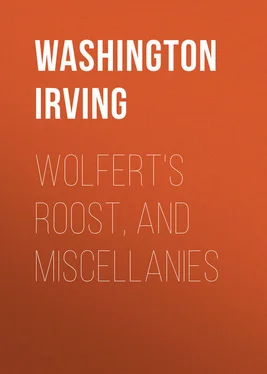Washington Irving - Wolfert's Roost, and Miscellanies
Здесь есть возможность читать онлайн «Washington Irving - Wolfert's Roost, and Miscellanies» — ознакомительный отрывок электронной книги совершенно бесплатно, а после прочтения отрывка купить полную версию. В некоторых случаях можно слушать аудио, скачать через торрент в формате fb2 и присутствует краткое содержание. Издательство: Иностранный паблик, Жанр: foreign_antique, foreign_prose, на английском языке. Описание произведения, (предисловие) а так же отзывы посетителей доступны на портале библиотеки ЛибКат.
- Название:Wolfert's Roost, and Miscellanies
- Автор:
- Издательство:Иностранный паблик
- Жанр:
- Год:неизвестен
- ISBN:нет данных
- Рейтинг книги:4 / 5. Голосов: 1
-
Избранное:Добавить в избранное
- Отзывы:
-
Ваша оценка:
- 80
- 1
- 2
- 3
- 4
- 5
Wolfert's Roost, and Miscellanies: краткое содержание, описание и аннотация
Предлагаем к чтению аннотацию, описание, краткое содержание или предисловие (зависит от того, что написал сам автор книги «Wolfert's Roost, and Miscellanies»). Если вы не нашли необходимую информацию о книге — напишите в комментариях, мы постараемся отыскать её.
Wolfert's Roost, and Miscellanies — читать онлайн ознакомительный отрывок
Ниже представлен текст книги, разбитый по страницам. Система сохранения места последней прочитанной страницы, позволяет с удобством читать онлайн бесплатно книгу «Wolfert's Roost, and Miscellanies», без необходимости каждый раз заново искать на чём Вы остановились. Поставьте закладку, и сможете в любой момент перейти на страницу, на которой закончили чтение.
Интервал:
Закладка:
Its origin, in truth, dates far back in that remote region commonly called the fabulous age, in which vulgar fact becomes mystified, and tinted up with delectable fiction. The eastern shore of the Tappan Sea was inhabited in those days by an unsophisticated race, existing in all the simplicity of nature; that is to say, they lived by hunting and fishing, and recreated themselves occasionally with a little tomahawking and scalping. Each stream that flows down from the hills into the Hudson, had its petty sachem, who ruled over a hand's-breadth of forest on either side, and had his seat of government at its mouth. The chieftain who ruled at the Roost, was not merely a great warrior, but a medicine-man, or prophet, or conjurer, for they all mean the same thing, in Indian parlance. Of his fighting propensities, evidences still remain, in various arrowheads of flint, and stone battle-axes, occasionally digged up about the Roost: of his wizard powers, we have a token in a spring which wells up at the foot of the bank, on the very margin of the river, which, it is said, was gifted by him with rejuvenating powers, something like the renowned Fountain of Youth in the Floridas, so anxiously but vainly sought after by the veteran Ponce de Leon. This story, however, is stoutly contradicted by an old Dutch matter-of-fact tradition, which declares that the spring in question was smuggled over from Holland in a churn, by Femmetie Van Slocum, wife of Goosen Garret Van Slocum, one of the first settlers, and that she took it up by night, unknown to her husband, from beside their farm-house near Rotterdam; being sure she should find no water equal to it in the new country – and she was right.
The wizard sachem had a great passion for discussing territorial questions, and settling boundary lines; this kept him in continual feud with the neighboring sachems, each of whom stood up stoutly for his hand-breadth of territory; so that there is not a petty stream nor ragged hill in the neighborhood, that has not been the subject of long talks and hard battles. The sachem, however, as has been observed, was a medicine-man, as well as warrior, and vindicated his claims by arts as well as arms; so that, by dint of a little hard fighting here, and hocus-pocus there, he managed to extend his boundary-line from field to field and stream to stream, until he found himself in legitimate possession of that region of hills and valleys, bright fountains and limpid brooks, locked in by the mazy windings of the Neperan and the Pocantico. 1 1 As every one may not recognize these boundaries by their original Indian names, it may be well to observe, that the Neperan is that beautiful stream, vulgarly called the Saw-Mill River, which, after winding gracefully for many miles through a lovely valley, shrouded by groves, and dotted by Dutch farm-houses, empties itself into the Hudson, at the ancient drop of Yonkers. The Pocantico is that hitherto nameless brook, that, rising among woody hills, winds in many a wizard maze through the sequestered banks of Sleepy Hollow. We owe it to the indefatigable researches of Mr. KNICKERBOCKER, that those beautiful streams are rescued from modern common-place, and reinvested with their ancient Indian names. The correctness of the venerable historian may be ascertained, by reference to the records of the original Indian grants to the Herr Frederick Philipsen, preserved in the county clerk's office, at White Plains.
This last-mentioned stream, or rather the valley through which it flows, was the most difficult of all his acquisitions. It lay half way to the strong-hold of the redoubtable sachem of Sing-Sing, and was claimed by him as an integral part of his domains. Many were the sharp conflicts between the rival chieftains for the sovereignty of this valley, and many the ambuscades, surprisals, and deadly onslaughts that took place among its fastnesses, of which it grieves me much that I cannot furnish the details for the gratification of those gentle but bloody-minded readers of both sexes, who delight in the romance of the tomahawk and scalping-knife. Suffice it to say that the wizard chieftain was at length victorious, though his victory is attributed in Indian tradition to a great medicine or charm by which he laid the sachem of Sing-Sing and his warriors asleep among the rocks and recesses of the valley, where they remain asleep to the present day with their bows and war-clubs beside them. This was the origin of that potent and drowsy spell which still prevails over the valley of the Pocantico, and which has gained it the well-merited appellation of Sleepy Hollow. Often, in secluded and quiet parts of that valley, where the stream is overhung by dark woods and rocks, the ploughman, on some calm and sunny day as he shouts to his oxen, is surprised at hearing faint shouts from the hill-sides in reply; being, it is said, the spell-bound warriors, who half start from their rocky couches and grasp their weapons, but sink to sleep again.
The conquest of the Pocantico was the last triumph of the wizard sachem. Notwithstanding all his medicine and charms, he fell in battle in attempting to extend his boundary line to the east so as to take in the little wild valley of the Sprain, and his grave is still shown near the banks of that pastoral stream. He left, however, a great empire to his successors, extending along the Tappan Zee, from Yonkers quite to Sleepy Hollow; all which delectable region, if every one had his right, would still acknowledge allegiance to the lord of the Roost – whoever he might be. 2 2 In recording the contest for the sovereignty of Sleepy Hollow, I have called one sachem by the modern name of his castle or strong-hold, viz.: Sing-Sing. This, I would observe for the sake of historical exactness, is a corruption of the old Indian name, O-sin-sing, or rather O-sin-song; that is to say, a place where any thing may be had for a song – a great recommendation for a market town. The modern and melodious alteration of the name to Sing-Sing is said to have been made in compliment to an eminent Methodist singing-master, who first introduced into the neighborhood the art of singing through the nose. D. K.
The wizard sachem was succeeded by a line of chiefs, of whom nothing remarkable remains on record. The last who makes any figure in history is the one who ruled here at the time of the discovery of the country by the white man. This sachem is said to have been a renowned trencherman, who maintained almost as potent a sway by dint of good feeding as his warlike predecessor had done by hard fighting. He diligently cultivated the growth of oysters along the aquatic borders of his territories, and founded those great oyster-beds which yet exist along the shores of the Tappan Zee. Did any dispute occur between him and a neighboring sachem, he invited him and all his principal sages and fighting-men to a solemn banquet, and seldom failed of feeding them into terms. Enormous heaps of oyster-shells, which encumber the lofty banks of the river, remain as monuments of his gastronomical victories, and have been occasionally adduced through mistake by amateur geologists from town, as additional proofs of the deluge. Modern investigators, who are making such indefatigable researches into our early history, have even affirmed that this sachem was the very individual on whom Master Hendrick Hudson and his mate, Robert Juet, made that sage and astounding experiment so gravely recorded by the latter in his narrative of the voyage: "Our master and his mate determined to try some of the cheefe men of the country whether they had any treacherie in them. So they took them down into the cabin and gave them so much wine and aqua vitae that they were all very merrie; one of them had his wife with him, which sate so modestly as any of our countrywomen would do in a strange place. In the end one of them was drunke; and that was strange to them, for they could not tell how to take it." 3 3 See Juet's Journal, Purchas Pilgrim.
Интервал:
Закладка:
Похожие книги на «Wolfert's Roost, and Miscellanies»
Представляем Вашему вниманию похожие книги на «Wolfert's Roost, and Miscellanies» списком для выбора. Мы отобрали схожую по названию и смыслу литературу в надежде предоставить читателям больше вариантов отыскать новые, интересные, ещё непрочитанные произведения.
Обсуждение, отзывы о книге «Wolfert's Roost, and Miscellanies» и просто собственные мнения читателей. Оставьте ваши комментарии, напишите, что Вы думаете о произведении, его смысле или главных героях. Укажите что конкретно понравилось, а что нет, и почему Вы так считаете.












